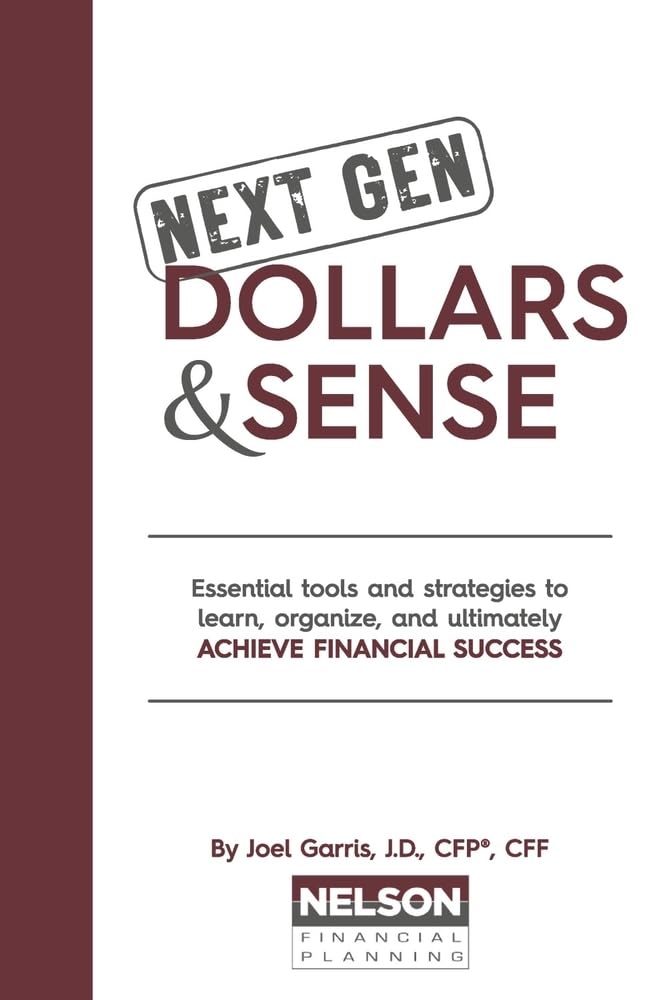Avoid costly mistakes by taking these smart, pre-retirement steps to boost your savings, cut waste, and build financial confidence.
These practical, expert-backed moves could save you thousands and supercharge your pre-retirement financial plan.
For many Americans, the final stretch before retirement is filled with more questions than answers:
- Am I saving enough?
- How much should I keep in cash?
- Am I missing something that could cost me later?
If that sounds familiar, you’re not alone – and you’re definitely in the right place. In this episode of Dollars & Sense financial podcast, Joel Garris, Certified Financial Planner™ and fiduciary at Nelson Financial Planning, breaks down five often-overlooked strategies that can help you maximize your savings, reduce unnecessary expenses, and enter retirement with confidence.
#1. Create (and Stick to) a Real Budget
You can’t fix what you can’t see – and when it comes to your money, visibility is power. That’s why budgeting is the foundation of any successful financial plan.
Budgeting is the cornerstone of every solid retirement plan, yet it’s one of the most underutilized tools for people approaching retirement. Many assume they’re doing “well enough” until they look under the hood and realize their spending habits are quietly undermining their long-term goals.
“The best place to figure out where you can find money to save is to look at how you’re spending money in the first place,” says Joel Garris, CFP®.
Why Budgeting Matters More Over 50
If you’re over 50, budgeting isn’t just about managing bills – it’s about preparing for a future where your income may be fixed. Without a clear plan, many pre-retirees end up either overspending their savings too early or underestimating the cost of essentials like healthcare, housing, or even leisure activities.
According to a 2024 Schwab Retirement Survey, nearly 40% of Americans in their 50s said they didn’t know how much they were spending each month – yet 70% claimed they were “on track” for retirement. That disconnect is a red flag.
Budgeting Doesn’t Have to be Restrictive – It’s Empowering
Forget the old idea of budgeting as a set of limitations. A well-designed budget gives you freedom – the freedom to travel, spend time with your grandkids, or pursue passions without constantly worrrying about money.
Joel often explains it like this:
“A budget doesn’t mean you can’t spend. It simply tells your money where to go instead of wondering where it went.”
Where to Begin (Even if You’ve Tried Before)
The goal isn’t to create a spreadsheet masterpiece. It’s to get clarity. Start by tracking your actual expenses for 30 days – not what you think you’ll spend.
Step-by-Step
- Track all transactions – include every coffee, utility bill, insurance premium, and subscription.
- Categorize expenses – break them into essentials (housing, food, insurance) vs discretionary (entertainment, dining out)
- Find the leaks – look for recurring costs you can trim (such as subscriptions) or impulse purchases that add up
- Set monthly targets – assign spending limits based on your financial goals, not just your income
- Revisit weekly – budgets aren’t set-it-and-forget-it tools. Review and refine as needed.
Tools that do the Heavy Lifting
Manually entering numbers isn’t for everyone. Thankfully, there are robust tools that make budgeting less of a chore:
- You Need a Budget (YNAB) – helps you give every dollar a job and forecast your spending
- EveryDollar – a simple, intuitive interface perfect for beginners
- Tiller Money – a powerful hybrid of spreadsheets and automation for more hands-on users
Budgeting After 50: What to Watch for
Pre-retirees often underestimate:
- Healthcare costs – including dental, vision, and potential long-term care
- Inflation – a $4 coffee today could be $6 in 5 years
- Tax impacts – withdrawls from retirement accounts can push you into a higher tax bracket
By factoring these into your budget now, you’ll avoid big surprises later.
One Tip from Joel
“Start small if you need to – but start. Even if it’s just tracking what you spend on takeout this month, that’s more data than you had yesterday. And with data, comes better decisions.”
#2. Automate Your Savings – Let Your Money Work While You Sleep
Trying to will yourself into saving consistently can feel exhausting. That’s why building a system thata does the heavy lifting for you is a game-changer – especially when you’re in your 50s and aiming to maximize your nest egg before retirement.
Joel says it plainly:
“By automating, you do in fact make it easier – and when things are easier, we’re more likely to do it.”
This approach isn’t just about saving more – it’s about removing friction and emotion from the process. When transfers to your 401(k), Roth IRA, or high-yield savings account happen automatically, it’s out of sight and out of mind – yet it builds steadily and silently.
Why Automation is Powerful
- Reduces decision fatigue – you don’t have to think, you just save
- Eliminates missed opportunities – no more forgetting to send money at the end of the month
- Increases consistency – even modest, regular contributions can compound over time into a substantial sum
Take this behavioral psychology insight: we tend to stick with the default option presented to us. Automating your savings essentially makes saving the default – your future self will thank you for it.
How to Automate Smartly
- Schedule transfers right after payday
Set your contributions to go out the moment funds hit your checking account. That makes savings feel like the first move – not the last one. - Divide and conquer
Automate across multiple buckets:- Employer 401(k)
- Roth or traditional IRA
- High-yield emergency fund
- Health savings account (HSA), if applicable
- Reassess annually
As your income or goals evolve, increase your automation percentage – just 1-2% a year can vastly improve retirement readiness.
Bonus Video: Automating Your Financial Future
If you’re curious about making automation part of your routine, check out one of our podcast epsidoes “Path to Becoming a Millionaire & Smart Portfolio Rebalancing Tips”. It offers complementary insight into the mindset and mechanics of disciplined saving and investing.
Testing the Waters: Small Automation, Big Impact
Let’s say you automate $200 a month starting at 55 into a Roth IRA or high-yield account earning 5% annually. By age 65, you’d have over $30,000 – all without lifting a finger. Automation isn’t about radical moves, but consistent steps.
Joel put it simply:
“It takes the daily effort out of the equation so the results take care of themselves.”
#3. Review Recurring Charges You’ve Forgotten
It happens to all of us. You sign up for a free trial – and then three months later, you’re still getting charged, and you haven’t used the service since the first week.
In today’s digital world, subscription creep is one of the sneakiest ways your money can slip away – often unnoticed. And for those nearing retirement, every dollar wasted on unused services is a dollar that could be supporting your future lifestyle.
Joel gave a perfect example on the podcast:
“I noticed Amazon Audible was hitting my card – $4.99 a month – and I hadn’t used it in forever. It just kept charging me.”
That one small charge certainly doesn’t seem like much. But multiply it by five or ten forgotten subscriptions over the course of a year, and you’re potentially losing hundreds, or even thousands, of dollars.
Why It Matters More as You Approach Retirement
In your 50s and 60s, budgeting becomes more intentional. You’re not just covering bills – you’re prepping for a phase of life where your income may be fixed or reduced. Plugging financial “leaks” is simple, low-risk way to enhance your savings without making big sacrifices.
According to a 2024 CNET Money Report, the average American spends over $130 a month on digital subscriptions, often without realizing how many services they’re actively paying for.
“Talk about a great way to find money to save – it’s simply by stopping the withdrawl or the spending of those dollars on things that you aren’t using,” Joel emphasized.
What to Look for: Common Sneaky Subscriptions
- Streaming services (Netflix, Hulu, Disney+, etc.)
- Audio and e-book platforms (Audible, Scribd)
- Fitness and meditation apps (Peloton, Calm, Headspace)
- Software tools (Dropbox, Canva, Adobe)
- Online courses or coaching memberships
- Magazine and news site subscriptions
- Gym memberships or meal delivery kits
Step-by-Step: How to Audit Your Subscriptions
- Download your last 3 months of bank and credit card statements – use a highlighter or spreadsheets to make recurring charges
- Cross-check your email – search for terms like “renewal,” “subscription,” “trial,” or “invoice” to catch hidden auto-renewals
- Cancel or pause what you’re not actively using – many platforms allow pausing rather than full cancellation – perfect if you plan to return later
- Consolidate where possible – do you really need both Spotify and Pandora? Or Hulu, Netflix, and Max?
Tools that can Help
- Rocket Money (formerly TrueBill) – automatically scans your accounts and helps you cancel unwanted subscriptions with one tap
- Trim – a chatbot-based service that negotiates bills, finds recurring charges, and cancels subscriptions for you
- Hiatus – monitors your bills and upcoming subscriptions and flags sudden increases in pricing
Want to Take It a Step Further?
Trimming forgotten subscriptions is just one part of being financially proactive. The real key is creating a habit or regularly reviewing where your money is going – whether it’s on monthly streaming services or long-term investments, Joel dives deeper into this mindset in the podcast video “4 Questions to Ask EVERY Time You Check Your Investments,” where he outlines a simple but powerful framework for evaluating financial decisions through the lens of purpose, performance, and risk. It’s a great follow-up if you’re ready to take control not just of your expenses – but your entire financial picture.
“Just as we advocate reviewing your subscriptions and overall spending, this video encourages you to question your investments with purpose, ensuring every dollar works with deliberate intent.”
#4. Tame the Dining-Out Habit – Eat Smarter, Save Better
Dining out offers convenience and enjoyment, but when not tracked, it can quietly erode your pre-retirement savings. For those in their 50s aiming to maximize their nest egg, reclaiming this category can lead to meaningful financial gains.
Joel pointed out:
“It’s one of the areas where inflation has hit the most.”
During periods of rising prices, restaurant bills often increase without notice. A simple dinner out twice a week for two people can cost upwards of $400 – $800 monthly, amounting to $5,000 to $10,000 yearly. That’s a significant chunk that could instead fund your Roth IRA or elevate your emergency fund with compounding potential over time.
Why Reducing Dining Spending Packs a Punch
- Direct savings opportunity – unlike fixed costs, cutting down on restaurant spending is under your control and instantly powerful
- Inflation sensitivity – restaurant prices often balloon faster than grocery or retail inflation, making occasional meals a rising cost burden
- Spending awareness – reducing discretionary eating teaches discipline and helps refocus finances toward long-term goals
Action Plan: Small Adjustments, Big Returns
| Step | Action |
| Track the truth | Record how much you spend eating out each week to establish a baseline |
| Set a clear limit | Decide on, say, two dinners out per month, not per week |
| Reallocate the savings | Every dollar not spent is a dollar you don’t need to earn – redirect it straight into savings or investments |
| Plan smarter outings | Make restaurant meals a special treat – plan ahead, choose budget-friendly venues, or leverage deals and loyalty programs |
Final Dining-Out Takeaway
A small cutback in dining-out habits doesn’t just reduce your monthly expenses – it reinforces a proactive money mindset. As Joel said, being intentional today gives you a smoother, more secure financial path tomorrow. Combine measured dining habits with regular financial reviews, and you’ll create a compound advantage that serves you well in retirement planning.
#5. Check Your Rates – Maximize Every Dollar You’re Paying and Earning
One of the most overlooked ways to free up retirement savings is simply this: know what your money is costing you – or earning you.
Whether it’s credit card interest or subpar savings account returns, understanding your “money in / money out” interest rates can uncover some of the biggest inefficiencies in your financial plan.
Joel shared an eye-opener:
“Store credit cards . . . have some of the highest interest rates . . . north of 30%. The 10% you saved buying a sweater? You might pay that back three times over.”
In a world of 20% – 30% credit card APRs and savings accounts still paying less than 0.50%, failing to check your rates is willingly signing up for financial underperformance.
Two Sides of the Rate Equation
- Interest You’re Paying (Bad Debt)
- credit cards (especially store cards) often carry astronomical APRs – sometimes over 30%
- carrying a balance means paying exponentially more over time
- some store promotions mask long-term debt traps
- Interest You’re Earning (Missed Opportunities)
- many savings and checking accounts offer less than 0.10% interest
- high-yield savings, CDs, and money market accounts offer 10-20x that return
- inflation erodes stagnant savings fast
Quick Fixes to Check Your Rates
| Task | Solution |
| Audit your credit cards | Check APRs. Consider balance transfers or paying down aggressively. |
| Compare your savings rate | Ues toosl like Bankrate or NerdWallet to find high-yield options |
| Evaluate CD and money market rates | Look at short-term CDs if you’re saving for something 1-3 years out. |
| Check your mortgage and auto loan | Refinance if it makes sense given your timeline to retirement. |
Final Rates Takeaway from Joel
“If you’ve got savings sitting somewhere earning next to nothing, that money could be working harder for you. And if you’re paying 30% interest? That’s a fire to put out first.”
The fastest way to supercharge your financial position isn’t always more income – it’s less drag. Eliminate high-interest debt and put your savings where it grows.
How Much Should You Really Keep in Emergency Savings?
The question isn’t should you have an emergency fund – it’s how much should you keep in it . . . and when is too much, actually too much?
If you’ve been saving for decades, you might think holding a big cash cushion is the safest bet. But for many, that money could be working harder elsewhere.
Joel explained it clearly:
“I don’t care how much money you’ve got in savings – if you’re got a credit card costing you 30%, you’re losing money.”
This underscores the importance of tailoring your emergency fund size to your real financial situation – not a one-size-fits-all rule.
Joel’s 4-Tier Emergency Fund Strategy
Instead of aiming for some arbitrary goal, Joel breaks emergency savings into 4 real-life categories, each with different targets.
Category 1: You’re in High-Interest Debt
“If you’re in debt . . . you may want to have your savings be much less than you think.”
Why? Because every dollar in your savings account earning 0.5% interest is being offset by debt costing you 25% or more. In this case, only keep enough cash to cover true emergencies (think: one month of living expenses) and direct the rest to debt reduction.
Category 2: Your Income and Expenses Are Stable
This is the classic scenario: you’re employed, your expenses are predictable, and retirement is on the horizon.
- Aim for 3-6 months of living expenses (not gross income)
- Living expenses = what you actually spend each month on essentials (housing, food, insurance – not luxuries)
“Living expenses are what you spend after taxes – not your entire paycheck,” Joel clarified.
Category 3: Your Income is Inconsistent
If you’re self-employed, a contractor, or still doing gig work, you’ll need a larger safety net.
- Joel recommends 6-12 months of expenses
- This gives you breathing room during seasonal slowdowns or unexpected gaps in income
Category 4: You Have a Big Purchase Coming Up
Planning to buy a car, put a down payment on a house, or fund a wedding?
Keep those funds fully liquid – even if it means holding more than 12 months of temporarily.
“That’s money you’re going to use in the near term, so you want to have that sitting in savings.”
What If You Have Too Much in Savings?
Joel often sees retirees or near-retirees sitting on excessive cash – $50,000 – $100,000 or more – earning next to nothing.
“That’s when you look at alternatives. Should I fund a Roth? Should I increase what I’m contributing to my 401(k)?”
Once you’ve matched your category’s emergency target, consider putting surplus cash into:
- Roth IRAs (especially if you’re over 50 and eligible for catch-up contributions)
- HSA (if still available and under 65)
- A conservative, diversified investment portfolio
“You don’t want too much sitting idle. Rebalancing and reallocating are how you grow.”
Final Thoughts: Small Moves Now = Big Impact Later
Getting financially ready for retirement doesn’t have to be overwhelming. It’s not about making drastic changes overnight – it’s about building momentum with smart, repeatable decisions.
Each of the 5 tips in this podcast – and this blog – offer a low-risk, high-impact way to free up cash, boost your savings, and eliminate waste. Whether it’s trimming forgotten subscriptions, eating out less, or finally automating that Roth contribution, these aren’t just money moves – they’re mindset shifts.
“You’ve got to make things easier. If they’re easier, they’re more likely to happen,” Joel emphasized throughout the episode.
And the best part? None of these strategies require a massive income increase or lifestyle downgrade. They simply require intentionality – and that’s something you can start building today.
Here’s What to do Next:
- Revisit your emergency fund – which of the 4 categories do you fall into?
- Check your last 3 bank statements – find recurring charges you forgot about
- Automate something today – even $50 a month into a Roth is a powerful start
- Take one dinner off your restaurant calendar – redirect those dollars into your high-yield savings account
- Log into your bank or credit card account – look at those interest rates – could your money be working harder
“At the end of the day, if you do even one of those things, you’ll already be in a better position than you were last week,” Joel says.

Free Resource: Get the Book!
When you’re ready to take these strategies further, Nelson Financial Planning offers a free in-office consultation – plus a complimentary copy of our newest book NextGen Dollars & Sense.
Closing Thought
Whether retirement is five years away or right around the corner, remember: It’s not too late to get organized, optimize, and grow.
And you don’t have to do it alone. The team at Nelson Financial Planning is here to help – no pressure, no account minimums, just personalized, fiduciary advice built around you.
ABOUT THE AUTHOR

Joel J. Garris, JD, CFP®, is the President and CEO of Nelson Financial Planning and the voice behind the Dollars & Sense podcast. A seasoned financial advisor with over 20 years of experience, Joel helps everyday investors make sense of complex markets with clarity and confidence. When he’s not simplifying retirement strategies or decoding economic trends, he’s probably on air delivering straight-talk financial advice – no fluff, just facts.
- 8 Wonders1
- Bank Investments3
- Beating Inflation1
- Budget for Retirement5
- Corporate Transparency Act2
- Digital Currency1
- Energy Tax Credits1
- ESG Funds1
- Featured Blog0
- Financial Planning13
- Financial Success4
- Importance of Dividends2
- Investment Portfolio5
- Investment Strategy3
- IRA1
- Joel Garris1
- Nelson Financial Planning5
- Net Worth Improvement1
- Next Gen Dollars and Sense1
- One Big Beautiful Bill Act (OBBBA)1
- Pension Plans1
- Podcast Transcripts8
- Retirement “Secure” Act2
- Retirement Income Planning3
- Retirement Planning7
- Retirement Regrets5
- Social Security4
- Tax Liability3
- Tax Planning7
- Year-End Tax Changes3






